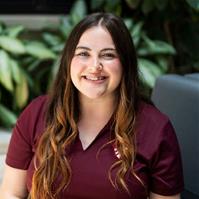What is Sports Administration?
Sports Administration focuses on the technical knowledge and professional skills required for a career in the sports industry. Grounded in Bellarmine’s liberal arts foundation, the Sports Administration major integrates a cohesive body of sports
knowledge with theories and skills from the disciplines of history, psychology, economics, law and communications.
What makes Bellarmine's approach to Sports Administration stand out?
Bellarmine is located in the heart of Louisville, which makes it possible for Sports Administration majors to gain relevant, hands-on experience through internships with leading sports organizations in the region. Past internship placements include Louisville
FC Soccer Club, the Louisville Bats, Valhalla Golf Club, Louisville Metro Parks and Recreation, the NCAA, the USTA, and more.
Bellarmine also provides the option to earn your bachelor’s degree and master’s degree at the same time with one of several five-year programs pairing Sports Administration with an MBA or Master of Arts in Communication. This program also
fulfills all the prerequisites for Bellarmine's Doctor of Physical Therapy program.
The Student Perspective
 Kaci Huff is a senior majoring in Sports Administration with minors in Communication, Marketing Communication, and Television News and Sports Broadcasting. Huff recently participated in a Sports Administration trip sponsored
by Women in Sports Enrichment (WISE), spending time in Colorado Springs at the offices of the United States Olympic & Paralympic Committee.
Kaci Huff is a senior majoring in Sports Administration with minors in Communication, Marketing Communication, and Television News and Sports Broadcasting. Huff recently participated in a Sports Administration trip sponsored
by Women in Sports Enrichment (WISE), spending time in Colorado Springs at the offices of the United States Olympic & Paralympic Committee.
Here’s what Huff had to say about her experience in Bellarmine’s Sports Administration program.
Q: What kind of career do you plan to pursue after graduation?
KH: I want to do something in sports media. I work for ESPN+ through Bellarmine right now and I’ve gotten to do camera work, graphics work, I’ve done sideline reporting for the men’s soccer team—I’ve gotten to do a lot of
different things.
Q: Do you feel like the size of Bellarmine makes those types of opportunities more accessible?
KH: Absolutely. I’ve gotten these opportunities through connections with different professors. Professor Fogle, who I’ve had for a lot of classes, recommended me for the ESPN job. So, because of the professor connection I was able to get that job,
and I think that job has helped me narrow down what I want to do, and I feel like now when I graduate in the spring, I actually have the experience I need to go get a job like that.
Q: How would you describe the learning environment at Bellarmine?
KH: I would almost call it intimate. I feel like everyone is very close. I’ve always made at least one new friend from every class that I’ve taken inside and outside of Sports Administration. It just feels like the professors know me and care
that I succeed, whether in their class, in my career, in college, anything like that. It’s easy to ask questions and it’s easy to get help, which I’ve really appreciated, especially in classes where I’ve struggled.
Q: How would you describe the community within the Sports Administration program?
KH: You get comfortable knowing the people around you and you can grow from them. I’ve had group projects with a lot of the same people, and I continue to learn from them and grow with them. Learning about what you can do with a Sports Administration
degree is also really cool. I’ve met a lot of people who want to pursue different paths with their degree which is a cool thing to be a part of.
Q: How has your experience in this program helped you prepare for life after Bellarmine, in both a professional and personal sense?
KH: Professionally I think I’m a lot more confident in my ability now. I feel comfortable going into a sports position and I have the confidence to feel like I know I can do this job really well. Personally, I love the community that Bellarmine
has given me. I feel like I’ve grown to be a better person from the support of my classmates and my professors and different faculty on campus.
Q: Do you feel like your experience in this program has helped you find your purpose or calling for life after college?
KH: Yeah, 100 percent. I feel like I’ve always known sports pretty well, but in college I’ve really delved into a lot of the numerical statistics and different things. The number of women in the sports field is pretty low, so for me it helped
me find that I can be that inspiration for other people, you can do the things that you’re passionate about regardless of if you’re a majority in that field. Being at Bellarmine has shown me my purpose is to pursue this and show that just
because you’re not the majority in a space you still deserve to be there.
Q: What would you say to a prospective student interested in studying Sports Administration at Bellarmine?
KH: I looked at a lot of schools with Sports Management and Sports Administration programs and the thing that really drew me to Bellarmine’s was how broad it is and how comprehensive it is. You can take law classes, psychology classes, business
classes—things that I never thought I’d even be interested in and those have been some of my favorite classes I’ve ever taken. So, I just tell people you’re going to get such a comprehensive view of the sports industry, you’re
going to have more information than you know what to do with, but it is really cool, and I wouldn’t change for a second that I came here.
The Faculty Perspective
 Dr. Daniel Bauer has taught at Bellarmine since 1995 and is the current director of the Sports Administration program. He holds an MBA from the University of Kentucky and a Doctor of Business Administration with a major in Finance from Mississippi State
University and served as Dean of the Rubel School of Business at Bellarmine from 2000-2015.
Dr. Daniel Bauer has taught at Bellarmine since 1995 and is the current director of the Sports Administration program. He holds an MBA from the University of Kentucky and a Doctor of Business Administration with a major in Finance from Mississippi State
University and served as Dean of the Rubel School of Business at Bellarmine from 2000-2015.
Bauer says a major advantage of Bellarmine’s approach to the Sports Administration program is that it offers students the flexibility to develop a highly personalized pathway for their professional aspirations.
“The Sports Administration degree at Bellarmine is designed to give students flexibility in tailoring the degree to their interests. The curriculum has an in-depth liberal arts-based focus on Sports Administration with an additional 13 classes
of free electives that allow for breadth or depth through a second major or minor. For example, 60 percent of Sports Administration majors are pursuing a second major, minor or early entry graduate program.”
Bauer adds that faculty engagement and support is a critical component of the program, giving students the opportunity to work in close collaboration with their faculty advisor as they devise their own path. With this approach, students can be confident
their studies will lead to success in the program and purposeful careers in their area of interest.
Visit the Sports Administration program page for more information including program highlights and career opportunities.